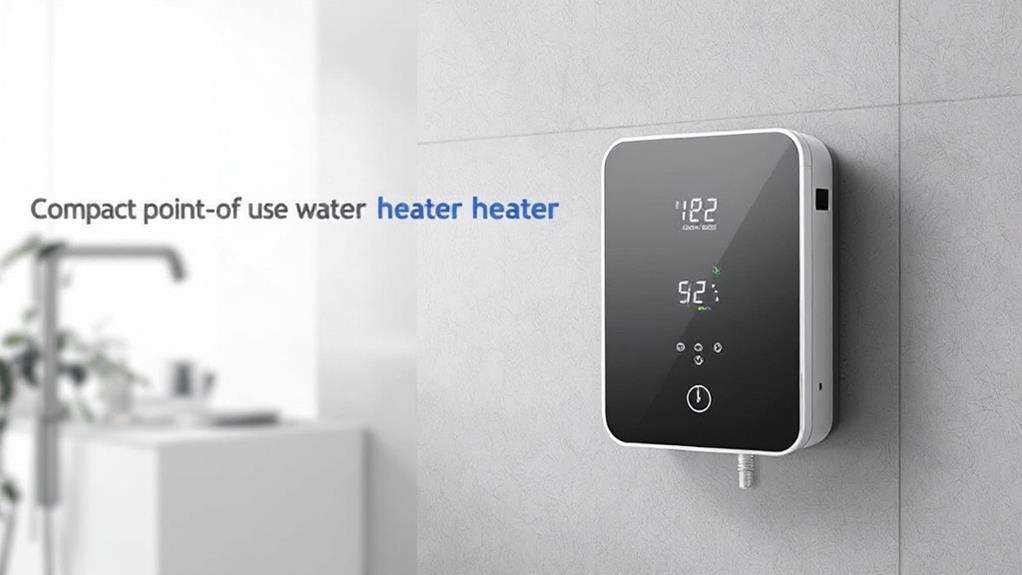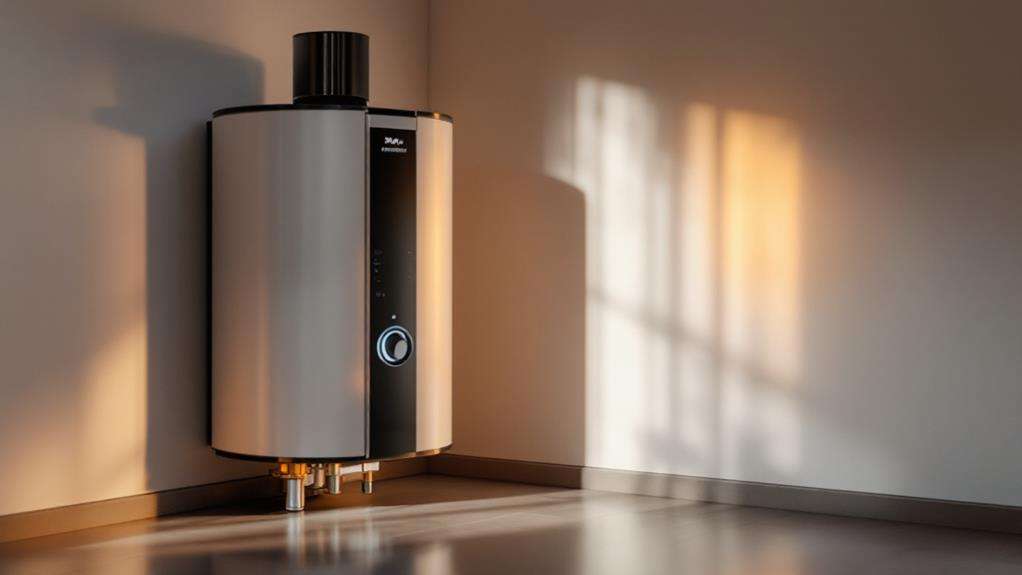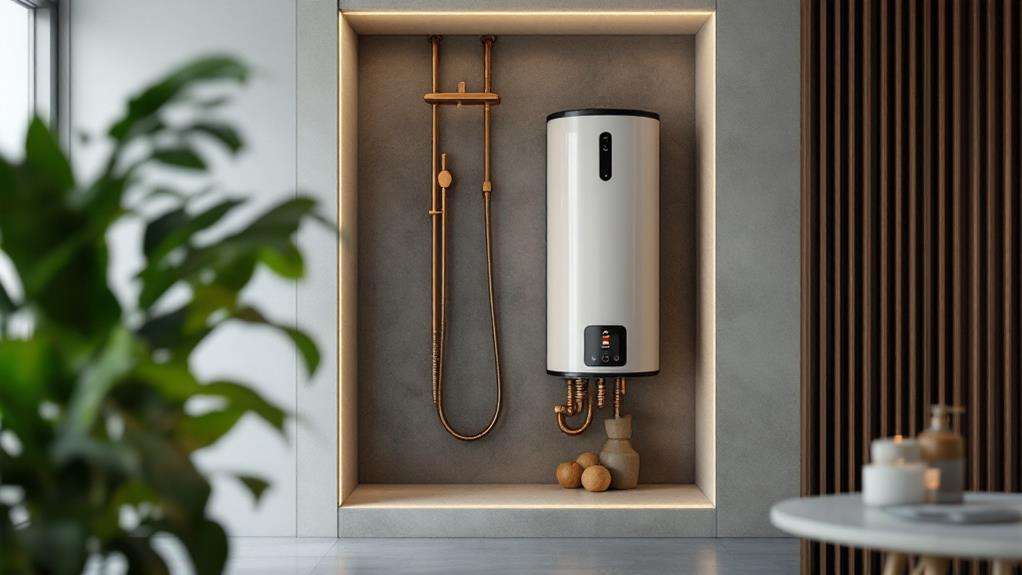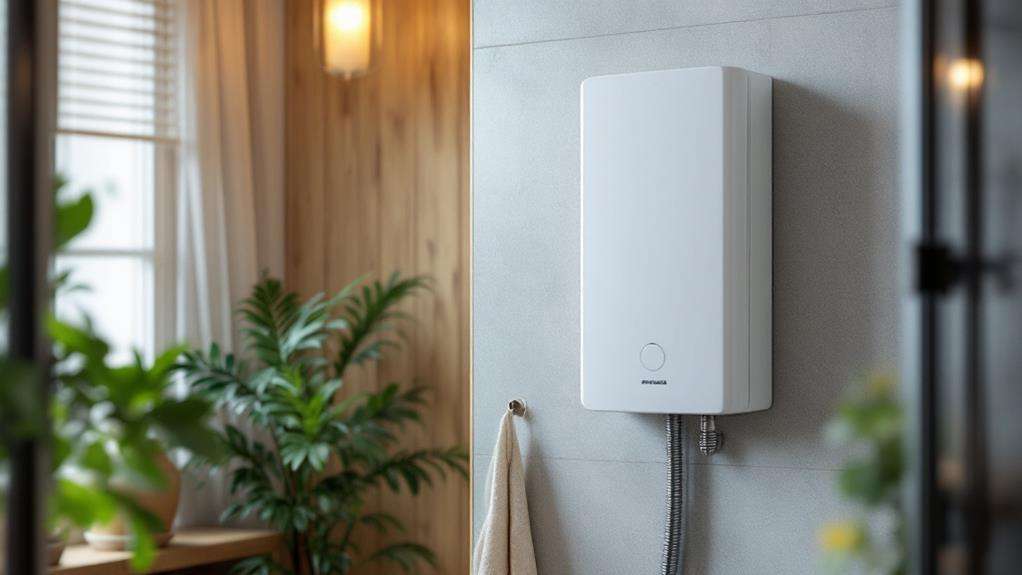Best Water Heaters for Small Spaces: Compact and Efficient Options
For tight spaces, compact and energy-efficient water heaters are the way to go. You'll get ample hot water without sacrificing valuable floor space. Tankless models mount on the wall, while point-of-use heaters integrate seamlessly near fixtures. Consider the right capacity for your household needs and prioritize high energy efficiency to save on utility bills long-term. Whether you choose electric or gas, the latest innovative designs deliver space-saving solutions that enhance comfort and sustainability. To explore these compact water heater options in more depth, continue reading to discover how they can transform your small space.
Key Takeaways
- Tankless water heaters are ideal for small spaces as they eliminate the need for a bulky storage tank, providing ample hot water while maximizing available floor space.
- Point-of-use water heaters are designed to be installed near specific fixtures, offering a compact and efficient solution for small homes or apartments with limited plumbing runs.
- When choosing a water heater for a small space, consider factors such as fuel type, dimensions, electrical or gas line capacity, and compatibility with the existing plumbing layout.
- Energy-efficient water heaters, such as those with high energy factor (EF) ratings, can provide long-term savings and environmental benefits, making them a smart choice for small-space dwellers.
- Innovative space-saving water heater designs, including compact tank models and wall-mounted tankless units, can seamlessly integrate into small spaces while delivering reliable hot water performance.
Understanding Compact Water Heater Benefits
When space is limited, a compact water heater can be a game-changer. These space-saving units are designed to fit in tight spots, freeing up valuable square footage in your home. Their compact size doesn't compromise performance - they can still provide ample hot water, just in a more efficient footprint.
One of the key benefits of a compact water heater is installation flexibility. Unlike traditional bulky models, these space-savers can often be mounted on walls or tucked into closets, making them a versatile option for homes with limited floor space. This ease of installation can also translate to lower labor costs during the setup process.
Beyond their physical size, compact water heaters also tend to be more energy-efficient, helping you save on utility bills. Their advanced technology maximizes heat transfer and minimizes standby losses, ensuring you get the hot water you need without wasting energy. For small-space dwellers, a compact water heater is a practical and cost-effective solution that won't compromise your comfort or convenience.
Evaluating Tankless Water Heater Options
Evaluating tankless water heater options requires careful consideration of your home's hot water needs and available space. Tankless models offer a compact and energy-efficient solution, but their fuel type and installation requirements must be taken into account.
When exploring tankless options, you'll need to consider the fuel type. Tankless heaters can be powered by electricity, natural gas, or propane. Electrical models are generally easier to install but may not provide as much hot water output as gas-powered units. Gas-fueled tankless heaters, on the other hand, can deliver higher flow rates but may require additional venting and gas line modifications during installation.
The installation process is another crucial factor:
- Ensure the heater's dimensions fit the available wall space.
- Evaluate the electrical or gas line capacity to support the tankless unit.
- Determine if any additional plumbing work is needed to integrate the heater.
- Consider the accessibility for future maintenance and repairs.
Exploring Point-of-Use Water Heater Features

Alongside tankless models, point-of-use water heaters offer a compact and flexible solution for small spaces. These on-demand units are designed to be installed near the specific fixtures they serve, eliminating the need for lengthy plumbing runs. Their installation requirements are generally less involved, often requiring only a standard electrical outlet and basic plumbing connections.
When evaluating point-of-use options, consider the plumbing considerations. Look for models that are compatible with your existing plumbing layout, whether that's using flexible hoses or straightforward connections. Assess the water pressure and flow rate needs for your application to ensure the heater can adequately meet your hot water demands. Additionally, pay attention to the heating capacity and recovery time to ensure the unit can keep up with your usage patterns.
Point-of-use water heaters excel at providing hot water on-demand without occupying valuable floor space. By understanding the installation requirements and plumbing needs, you can select a compact and efficient solution tailored to your small-space water heating needs.
Choosing the Right Capacity for Small Spaces
Choosing the right capacity for your small-space water heater is key to meeting your hot water needs efficiently. When dealing with space constraints, you'll want to consider the size of your household and your typical hot water usage. Generally, a 10-20 gallon tank-style or a tankless water heater rated for 2-4 gallons per minute (GPM) should be sufficient for a small home or apartment.
To determine the right capacity, keep these factors in mind:
- Number of occupants: More people in the home means a higher hot water demand.
- Appliance usage: Washing machines, dishwashers, and showers all require hot water.
- Installation requirements: Ensure the water heater fits in your designated space and meets any local codes.
- Energy efficiency: Look for models with high energy factor (EF) ratings to save on utility bills.
Prioritizing Energy Efficiency in Water Heaters

When selecting a water heater for your small space, energy efficiency should be a top priority. After all, energy-efficient appliances not only save you money on utility bills but also help reduce your carbon footprint and address broader sustainability concerns. Look for water heaters with high energy factor (EF) ratings, which measure how efficiently the unit converts fuel into hot water. Consider tankless or heat pump models, as they typically offer superior energy efficiency compared to traditional tank-style heaters. Additionally, research any available tax credits or rebates that may offset the initial cost of an energy-efficient water heater. By prioritizing efficiency, you'll enjoy long-term savings and the satisfaction of making a more eco-friendly choice for your home.
Considerations for Apartment and Tiny Home Installations
Fitting a water heater in a small apartment or tiny home requires carefully considering the available space. With limited square footage, installation requirements become critical to ensure the water heater fits seamlessly and efficiently. When selecting a unit for an apartment or tiny home, keep these factors in mind:
- Compact dimensions: Look for water heaters with a small footprint, often referred to as "point-of-use" or "tankless" models, which can be mounted on the wall or tucked away in a closet or cabinet.
- Venting considerations: Ensure the water heater can be properly vented within the tight confines of your living space, whether it's a direct-vent or power-vent model.
- Electrical or gas compatibility: Determine if your apartment or tiny home can accommodate the power source required, whether it's electric or gas.
- Energy efficiency: Prioritize water heaters with high energy efficiency ratings to minimize your utility costs and environmental impact.
Maintenance and Lifespan of Compact Water Heaters

Maintaining your compact water heater is crucial to ensuring its longevity and optimal performance. Follow the manufacturer's recommended routine maintenance schedules, which typically include flushing the tank, checking the anode rod, and inspecting the thermostat and heating elements. These simple tasks can extend the lifespan of your unit and prevent costly breakdowns.
Many compact water heater models come with extended warranty benefits, so be sure to register your product and understand the coverage details. This can provide you with extra peace of mind and protection against unexpected repair costs. Additionally, consider investing in a water softener if you live in an area with hard water, as this can significantly reduce mineral buildup and extend the life of your compact water heater.
With proper care and maintenance, your compact water heater can reliably provide hot water for your small space for years to come.
Comparing Electric and Gas-Powered Water Heaters
The choice between electric and gas-powered water heaters often comes down to personal preference and the unique requirements of your small space. Electric models are generally more compact and easier to install, as they don't require the venting necessary for gas heaters. However, gas-powered units often boast better fuel efficiency, which can translate to lower energy bills in the long run.
When it comes to installation requirements, electric heaters have a clear advantage. They simply need to be plugged into a power source, whereas gas models require professional installation to ensure proper ventilation and connection to a gas line. This can be an important consideration if you're working with limited space or a tight budget.
Here are 4 key factors to consider when comparing electric and gas water heaters for your small space:
- Fuel efficiency
- Installation requirements
- Upfront cost
- Ongoing energy expenses
Ultimately, the best option will depend on your specific needs and constraints. Take the time to weigh the pros and cons of each type to make an informed decision.
Innovative Space-Saving Water Heater Designs

Innovative space-saving designs have revolutionized the way we think about water heaters for small spaces. Demand-driven operation and compact tank designs are leading the charge, offering homeowners more flexibility and efficiency than ever before.
Tankless water heaters, for instance, provide hot water on demand, eliminating the need for a bulky storage tank. These streamlined units can be mounted on a wall, freeing up valuable floor space. Compact tank designs take the concept a step further, packing the same heating capacity into a fraction of the size. Some models even feature a slim, under-the-counter profile, blending seamlessly into your kitchen or bathroom.
Beyond their space-saving benefits, these innovative water heaters boast impressive energy efficiency. Demand-driven operation ensures you only heat the water you need, reducing utility bills and minimizing your environmental impact. With a wide range of capacities and fuel sources available, there's a space-saving solution to meet the needs of any small home or apartment.
